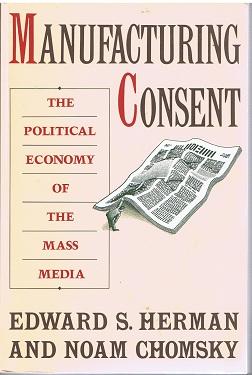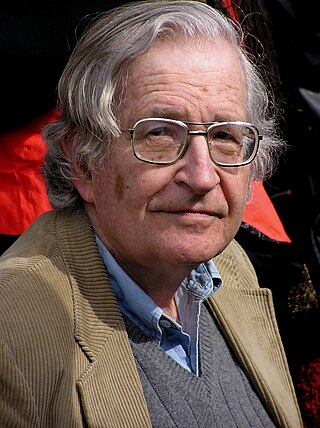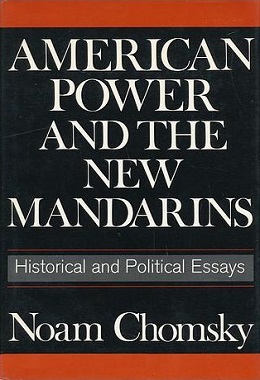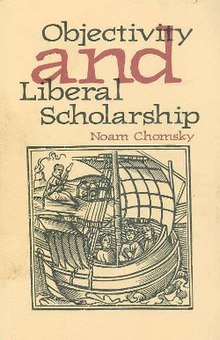
Manufacturing Consent: The Political Economy of the Mass Media is a 1988 book by Edward S. Herman and Noam Chomsky. It argues that the mass communication media of the U.S. "are effective and powerful ideological institutions that carry out a system-supportive propaganda function, by reliance on market forces, internalized assumptions, and self-censorship, and without overt coercion", by means of the propaganda model of communication. The title refers to consent of the governed, and derives from the phrase "the manufacture of consent" used by Walter Lippmann in Public Opinion (1922). The book was honored with the Orwell Award.

Avram Noam Chomsky is an American professor and public intellectual known for his work in linguistics, political activism, and social criticism. Sometimes called "the father of modern linguistics", Chomsky is also a major figure in analytic philosophy and one of the founders of the field of cognitive science. He is a laureate professor of linguistics at the University of Arizona and an institute professor emeritus at the Massachusetts Institute of Technology (MIT). Among the most cited living authors, Chomsky has written more than 150 books on topics such as linguistics, war, and politics. Ideologically, he aligns with anarcho-syndicalism and libertarian socialism.

An intellectual is a person who engages in critical thinking, research, and reflection about the reality of society, and who proposes solutions for the normative problems of society. Coming from the world of culture, either as a creator or as a mediator, the intellectual participates in politics, either to defend a concrete proposition or to denounce an injustice, usually by either rejecting, producing or extending an ideology, and by defending a system of values.

The propaganda model is a conceptual model in political economy advanced by Edward S. Herman and Noam Chomsky to explain how propaganda and systemic biases function in corporate mass media. The model seeks to explain how populations are manipulated and how consent for economic, social, and political policies, both foreign and domestic, is "manufactured" in the public mind due to this propaganda. The theory posits that the way in which corporate media is structured creates an inherent conflict of interest and therefore acts as propaganda for anti-democratic elements.

Hegemony or Survival: America's Quest for Global Dominance is a book about the United States and its foreign policy written by American political activist and linguist Noam Chomsky. It was first published in the United States in November 2003 by Metropolitan Books and then in the United Kingdom by Penguin Books.
David Cromwell is a British media campaigner and oceanographer. With David Edwards, he is a co-editor of the Media Lens website.
Edward Samuel Herman was an American economist, media scholar and social critic. Herman is known for his media criticism, in particular the propaganda model hypothesis he developed with Noam Chomsky, a frequent co-writer. He held an appointment as Professor Emeritus of finance at the Wharton School of Business of the University of Pennsylvania. He also taught at Annenberg School for Communication at the University of Pennsylvania.

Noam Chomsky is an intellectual, political activist, and critic of the foreign policy of the United States and other governments. Noam Chomsky describes himself as an anarcho-syndicalist and libertarian socialist, and is considered to be a key intellectual figure within the left wing of politics of the United States.

The Anti-Chomsky Reader is a 2004 anthology book about the linguist and social critic Noam Chomsky edited by Peter Collier and David Horowitz. Its contributors criticize Chomsky's political and linguistic writings, claiming that he cherry-picks facts to fit his theories.
What constitutes as a definition of fascism and fascist governments has been a complicated and highly disputed subject concerning the exact nature of fascism and its core tenets debated amongst historians, political scientists, and other scholars ever since Benito Mussolini first used the term in 1915. Historian Ian Kershaw once wrote that "trying to define 'fascism' is like trying to nail jelly to the wall".
"The Responsibility of Intellectuals" is an essay by the American academic Noam Chomsky, which was published as a special supplement by The New York Review of Books on 23 February 1967.

American Power and the New Mandarins is a book by American academic Noam Chomsky. Largely written in 1968 and published in 1969, it was his first text focused on politics and sets out in detail his opposition to U.S. involvement in the Vietnam War.
Counter-Revolutionary Violence: Bloodbaths in Fact & Propaganda is a 1973 book by Noam Chomsky and Edward S. Herman, with a preface by Richard A. Falk. It offers a critique of United States foreign policy in Indochina.
Several scholars have accused the United States of involvement in state terrorism. They have written about the US and other liberal democracies' use of state terrorism, particularly in relation to the Cold War. According to them, state terrorism is used to protect the interest of capitalist elites, and the U.S. organized a neo-colonial system of client states, co-operating with regional elites to rule through terror. This work has proved controversial with mainstream scholars of terrorism, who concentrate on non-state terrorism and the state terrorism of dictatorships.

Imperial Ambitions: Conversations with Noam Chomsky on the Post-9/11 World is a 2005 Metropolitan Books American Empire Project publication of interviews with American linguist and political activist Noam Chomsky conducted and edited by award-winning journalist David Barsamian of Alternative Radio.
This is a list of writings published by the American author Noam Chomsky.

Occupy is a short study of the Occupy movement written by the American academic and political activist Noam Chomsky. Initially published in the United States by the Zuccotti Park Press as the first title in their Occupied Media Pamphlet Series in 2012, it was subsequently republished in the United Kingdom by Penguin Books later that year.

Cambodian genocide denial is the belief expressed by some Western academics that early claims of atrocities committed by the Khmer Rouge government (1975–1979) in Cambodia were much exaggerated. Many scholars of Cambodia and intellectuals opposed to the U.S. involvement in the Vietnam War denied or minimized reports of human rights abuses of the Khmer Rouge, characterizing contrary reports as "tales told by refugees" and U.S. propaganda. They viewed the assumption of power by the Communist Party of Kampuchea as a positive development for the people of Cambodia who had been severely impacted by the Vietnam War and the Cambodian Civil War. On the other side of the argument, anti-communists in the United States and elsewhere saw in the rule of the Khmer Rouge vindication of their belief that the victory of Communist governments in Southeast Asia would lead to a "bloodbath."

Decoding Chomsky: Science and Revolutionary Politics is a 2016 book by the anthropologist Chris Knight on Noam Chomsky's approach to politics and science. Knight admires Chomsky's politics, but argues that his linguistic theories were influenced in damaging ways by his immersion since the early 1950s in an intellectual culture heavily dominated by US military priorities, an immersion deepened when he secured employment in a Pentagon-funded electronics laboratory in the Massachusetts Institute of Technology.

Requiem for the American Dream: The 10 Principles of Concentration of Wealth & Power is a book by political activist and linguist Noam Chomsky. It was created and edited by Peter Hutchinson, Kelly Nyks, and Jared P. Scott. It lays out Chomsky's analysis of neoliberalism. It focuses on the concentration of wealth and power in United States over the past forty years, analyzing the income inequality. The book was published by Seven Stories Press in 2017.













